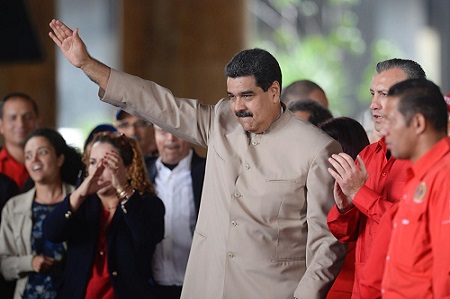Venezuela’s ‘Dire Straits’ Brings Together Neo-Marxism and Islamofascism: U.S. Navy Admiral
Featured Photograph: A demonstrator catches fire, after the gas tank of a police motorbike exploded, during clashes in a protest against Venezuelan President Nicolas Maduro, in Caracas on May 3. Venezuela's angry opposition rallied vowing huge street protests against President Nicolas Maduro's plan to rewrite the constitution and accusing him of dodging elections to cling to power despite deadly unrest.
While only a hopelessly brainwashed American could watch the goings on in Venezuela and still support the majority of the U.S. Democratic Party’s presidential hopefuls and the rank-and-file Democratic lawmakers, the political party that gave America the Ku Klux Klan, the Black Panther Party, the Nation of Islam, Antifa, the Weather Underground (Students for a Democratic Society SDS) and other leftist-radical organizations and super-rich financiers, such as George Soros is actually showing just how far the nation has drifted away from its constitutional principles.

This week, hungry and angry Venezuelan protesters began a more intense uprising sometimes with only their hands, rocks and Molotov cocktails as they blamed the violence on the Maduro administration’s alleged food shortages spread throughout the once most prosperous and oil-rich capitalist country in Latin America.
When Venezuelans decided to vote for a friend and comrade to Cuba’s Fidel Castro, President Hugo Chavez, little did they know it was the beginning of the country’s dire straits and the end of economic freedom as Chavez began to commandeer private sector businesses and services. He introduced Karl Marx to the people of Venezuela. That alone led to about 10 percent of Venezuela’s population to flee the onslaught of Neo-Marxist programs, increased crime, rising healthcare problems and becoming a hotbed of Islamic radicalism, Cuban troops, and now Russian military advisers.
After years of unabated recession and the world’s highest inflation rate, the corrupt government has plunged millions of Venezuelans into abject poverty, and Chavez’s successor President Nicolas Maduro’s authoritarian socialist regime faces mounting unrest, but his support from Cuban and Russian govern may tie the hands of the United States and European countries attempting to assist the forces of democracy who are facing a modern army led by a modern dictator..
Navy Adm. Craig S. Faller, commander of U.S. Southern Command, testifying before the Senate Armed Services Committee regarding the Defense Authorization Request for fiscal year 2020 and the Future Years Defense Program, mentioned the deterioration of the Venezuelan nation.
Adm. Faller’s Southcom area of responsibility includes Latin America south of Mexico, the waters adjacent to Central and South America, and the Caribbean Sea.
Faller told the senators on the committee that his top concern is Venezuela, where “the situation is dire. [Nicolas] Maduro’s illegitimate government starves its people by using food as a weapon, while corrupt generals are rewarded with money from illegal drug trafficking, oil profits and businesses, all at the expense of the population and the rank and file military.”

Adm. Faller mentioned four concerns in Central and South America:
- About 5 million people have fled Venezuela since 2015, creating crises in Colombia, Brazil, Ecuador and Peru.
- External state actors are expanding their influence in the Western Hemisphere, Faller said. Russia in particular, “enables actions in Venezuela, Nicaragua and Cuba that threaten hemispheric security and prosperity,” he said. As a leading state sponsor of terrorism, Iran’s activities in this hemisphere also are concerning, Faller noted.
- “Southcom is supporting diplomatic efforts and we are prepared to protect U.S. personnel and diplomatic facilities if necessary” in Venezuela, he said.
- Other ongoing concerns in the region include criminal organizations, narco-traffickers, illegal immigration, violent extremists, corruption and weak governments.
Although not mentioned specifically, Iran’s involvement in Venezuela opened the door to terrorist organizations to station fighters in that Latin American region. Iran’s proxy military-arm, Hezbollah has been involved in South America since the Bush administration.
Partnership Strategy
The U.S. is building strong partnerships with Southcom nations, Faller said, noting that these partnerships are not just military to military, but are also diplomatic partnerships by the State Department and by other organizations, such as the U.S. Agency for International Development and the departments of Justice and Homeland Security.
“Our security and prosperity are inextricably linked,” he said. “When our neighbors succeed, we succeed. And when our neighbors are threatened, we are threatened. Our partnerships in this region are critical to the layered defense of our homeland.”


